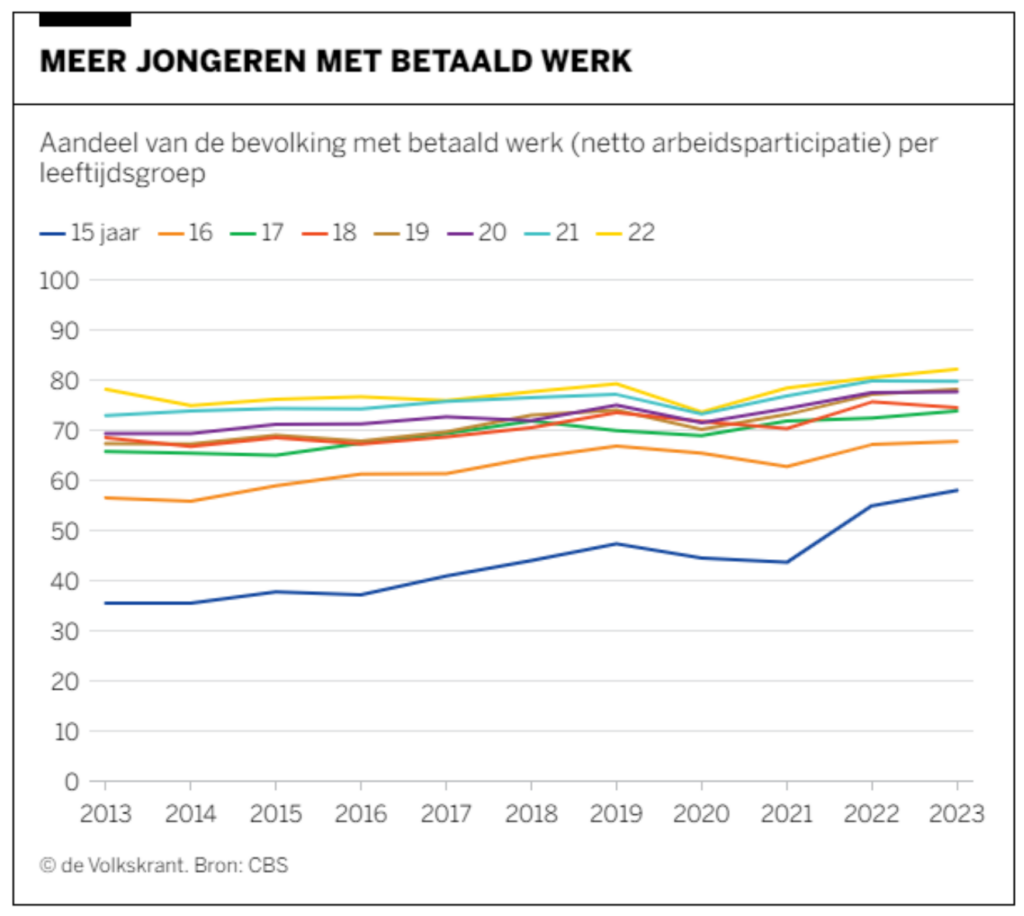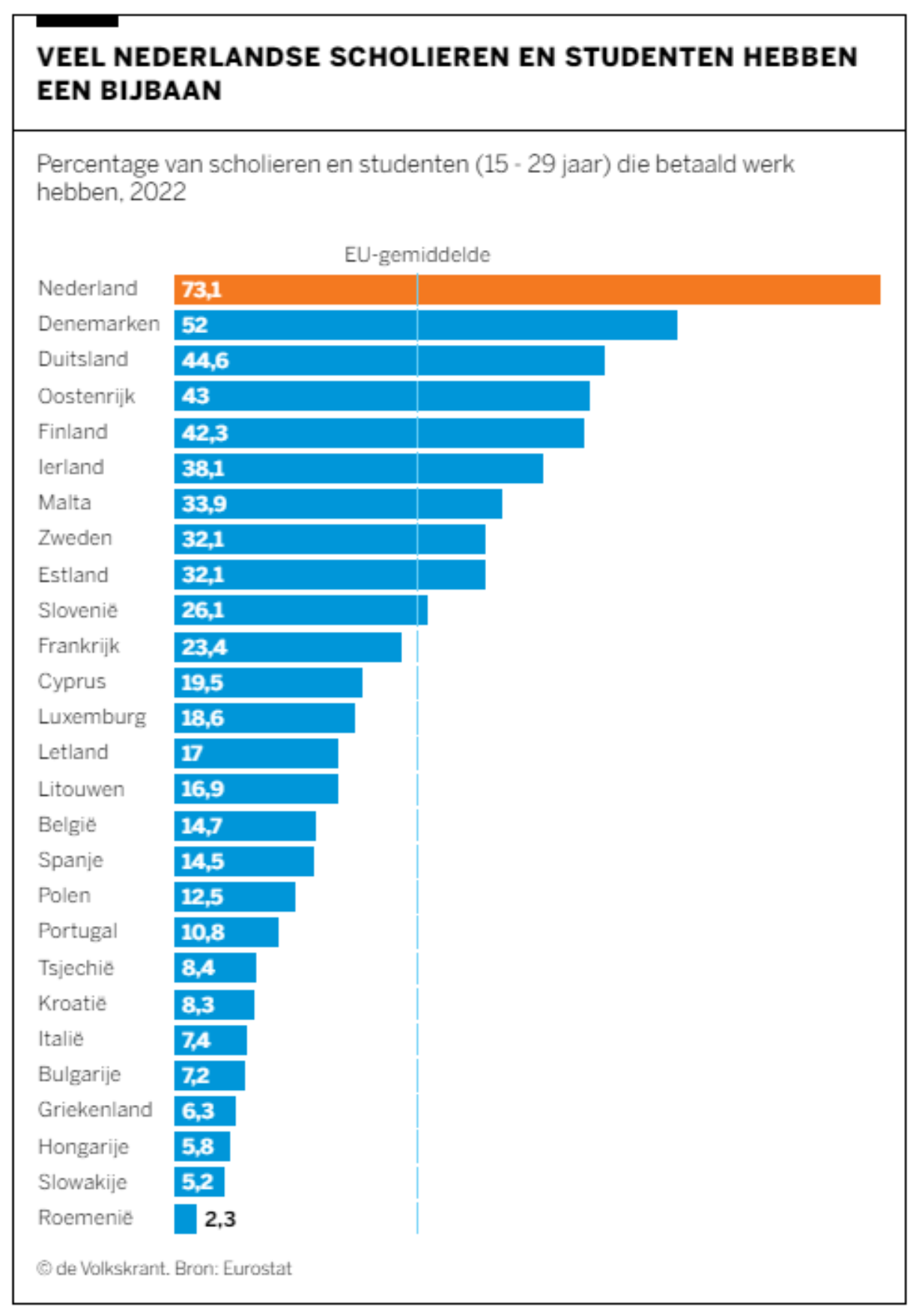How do students in Portugal and The Netherlands transistion to the labour market?
Ensuring that young people receive a good quality education is very important. The next generations will be shaping our future after all. The speed at which young people move from education to the workforce varies among EU member states. In some EU countries, young people begin working – often part-time, evenings and weekends – during their studies, while in other EU countries this is far less common. These differences lead to variation in how students enter into the labour market. Overall, we see interesting differences in the way we combine study and part time jobs in Europe. In this blog we discuss how these differences impact doing business, focusing on Portugal and The Netherlands.
A huge part of the Dutch student population has a part-time job
In the Netherlands, a part-time job has always been the norm for most students. A “side job” generates extra income, provides financial autonomy and at the same time helps to develop social skills needed for life after school. Working in bars, restaurants, hotels supermarkets and food delivery services are common options for students. Having a part-time job is seen as an asset for building a successful curriculum. And interesting: contrary to what older generations sometimes claim, today’s young Dutchies (Gen Z) are not lazy at all. Dutch newspaper Volkskrant did a deep dive in August 2024. This study shows that in the age group between 15 and 22 years, Dutch students have a part-time job more often than ever before. Here is a table with the evolution of employment rate of the 15-22 age group (2013-2023). Besides an (expected) dip during COVID, there has been a steady increase in young people with paid jobs. The stereotype of lazy Gen Z turns out to be an urban legend!
Learning from intercultural differences
At Obras Technology we are connecting Portuguese IT nearshore companies with Dutch entrepreneurs. Therefore we are always keen to discuss intercultural differences. We believe the culture we grow up in and that surrounds us day to day, impacts how we do business.
Differences within the European Union
An interesting aspect is the role a part-time job plays in the lives of students and young adults. This all reflects their background, experience, and social skills when entering the labour market. Is a part-time job considered an important way to prepare students for the future? Or is it viewed as a barrier to achieve good academic results and the student life experience during college? Pondering this question, Newspaper Volkskrant has provided us with some interesting information. Below is a 2022 table with a comparison between EU countries reflecting percentages of students with a paid job in the age group 15-29 years.
Upward trend since 2013
A “side hustle” has always been widespread practice among Dutch students, resulting in a historically high labour participation. However, there has been an upward trend over the past decade. This may be linked to the reduction in student allowances and other financial incentives during that time. As shown in the 2022 table, Dutch students lead the way in having part-time jobs.
Finland’s summer jobs culture
When we discussed our observations regarding the Netherlands with a Finnish business friend, we learned that the situation in Finland is quite different. Finnish students seem to have less financial need compared to Dutch students, maybe because Finland provides better financial support and facilities during the academic year. Despite this, Finnish labor participation is higher than the EU average of about 25%. One reason for this, as pointed out by our Finnish friend, is the long summer break. In Finland, the summer break lasts about three months, giving students ample time to relax and gain their first work experience.
Portugal’s focus on academic results
In Portugal, we have learned that students (and their parents) prioritize getting the most out of their education. Achieving high grades and fully experiencing student life, including taking enough downtime to recharge, is seen as important. As a result, combining this focus on academics with part-time jobs is less common than in Nordic countries. Many students and parents we have spoken to over the years worry that having a part-time job could lead to stress and take away energy, time, and motivation needed to excel academically. Having a part-time job is therefore not necessarily seen as a positive factor. A lot of parents we spoke with over the years prefer paying for all (or most) student expenses to avoid their children getting a part-time job.
In summary
There are notable differences in how students across the EU build their résumés, and understanding these differences is crucial, especially as European student and labor markets become more interconnected. In this blog, we have examined student experiences in Portugal and the Netherlands, with a brief detour to see what’s cooking in Finland.
Dutch students and employers value academic achievements and skills, but they also place a high importance on additional experiences. Examples are part-time jobs, voluntary work, international travel and developing personal interests. On the other hand, in Portugal, students and employers focus more on academic results. Which courses and universities students attended and their academic performance makes a difference. Grades and relevant studies are key factors in hiring young professionals in Portugal.
Relevance for nearshoring
When it comes to nearshoring in Portugal, we believe it is important for Dutch partners to understand why Portuguese students and juniors may have less work experience from “side jobs”. This insight helps determine their entry-level skills. This allows nearshore companies to offer additional support for acquiring necessary skills to land a project in the Netherlands. This understanding is also vital for Portuguese students who wish to further their academic careers or seek employment in the Netherlands. At the same time, understanding Portuguese student life and working culture is important for Dutchies that want to work with Portuguese companies and / or are looking to relocate to this beautiful country on the sunny side of Europe.





